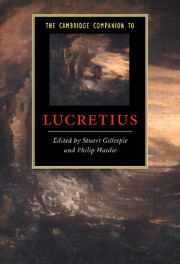Book contents
- Frontmatter
- Introduction
- Part I: Antiquity
- Part II: Themes
- 8 Lucretius and the history of science
- 9 Moral and political philosophy: readings of Lucretius from Virgil to Voltaire
- 10 Lucretius and the sublime
- 11 Religion and enlightenment in the neo-Latin reception of Lucretius
- Part III: Reception
- Dateline
- List of works cited
- Index of Main Lucretian Passages Discussed
- General Index
11 - Religion and enlightenment in the neo-Latin reception of Lucretius
from Part II: - Themes
Published online by Cambridge University Press: 28 May 2010
- Frontmatter
- Introduction
- Part I: Antiquity
- Part II: Themes
- 8 Lucretius and the history of science
- 9 Moral and political philosophy: readings of Lucretius from Virgil to Voltaire
- 10 Lucretius and the sublime
- 11 Religion and enlightenment in the neo-Latin reception of Lucretius
- Part III: Reception
- Dateline
- List of works cited
- Index of Main Lucretian Passages Discussed
- General Index
Summary
The Renaissance bishop and poet Marco Girolamo Vida may have aimed a gentle rebuke at Lucretian imitators when he warned the aspiring Latin poet to avoid the example of those who ‘pour out and pile up all things in their verses, without method, without art, especially if it is unknown, hidden, and not suitable for the ears of the crowd, such as the secret motions of the radiant heavens, or the inaccessible nature of the gods, or the uncertain origin of the impenetrable soul’ (De arte poetica 2.194-9). Many of the writers who composed Latin Lucretian poems in the early modern period did so wearing the robes of philosopher, physician, mathematician, even priest. Latin, the natural language choice for scholarship, science and theology from the fifteenth to the eighteenth centuries, brought challenges and opportunities of a different order from those facing Lucretius’ vernacular imitators. Latin Lucretianists more frequently composed long philosophical poems, and engaged more freely with current and controversial topics in science and religion. To imitate Lucretius in Latin was perhaps a less risky business than it was in the vernacular, the learned language screening out unauthorised access by less educated readers, and many women. Thus a former Jesuit, Camillo Garulli, could publish, in Catholic Rome, a Lucretian poem endorsing the Copernican ‘hypothesis’ at a time when it was still officially proscribed by the Church (1777). On the other hand, neo-Latin poets were arguably in greater danger of being pulled into Lucretius’ ideological orbit, if not sucked into the black hole of heresy. This essay will explore some neo-Latin responses to Lucretius’ thematics of religion and enlightenment. How did neo-Latin poets negotiate or exploit for their own purposes Lucretius’ attacks on superstition?
- Type
- Chapter
- Information
- The Cambridge Companion to Lucretius , pp. 185 - 202Publisher: Cambridge University PressPrint publication year: 2007
- 5
- Cited by

